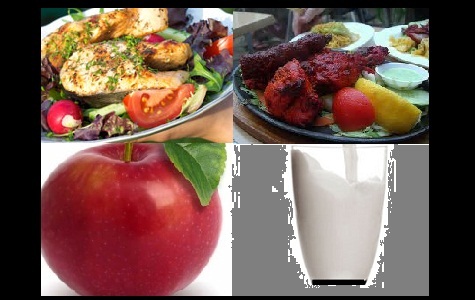
Nutrition plan for athletes
A good nutrition plan is needed for you to perform at your athletic best. It not only promotes optimal training by increasing muscle response time that is free of aches and pains,but also positive mental outlook by improving alertness and reducing exercise induced irritability. An athlete's nutrition plan should finely tuned.Its better to start by rewiring your own.
Carbohydrates are an athlete's main fuel. They are converted to glucose, a form of sugar, which is stored in muscles as glycogen. When you exercise, your body converts glycogen into energy. If you exercise for under 90 minutes, the stores of glycogen in your muscles are enough to fuel even high-intensity activity.
Calorie levels are matched to an elite athlete's energy needs year round. They do not gain weight during the off season as they correctly fuel their body, never over- or under-feeding it. This perfect balance prevents them from breaking down muscle to be used in the absence of adequate energy or storing excess as fat, leading to increased muscle drag. Protein does not provide a lot of fuel for energy, but it is important for maintaining muscle tissue. Milk is one of the best foods for recovery after an event, because it provides a good balance of protein and carbohydrates. Milk also contains both casein and whey protein. The combination may be particularly helpful for athletes. Whey protein is absorbed quickly, which can help speed recovery immediately after an event. Casein is digested more slowly, helping to ensure long-term recovery of muscle after a exhausting event. Milk also contains calcium, which is important for maintaining strong bones.
A light breakfast, sports drink or energy bar improves early morning training efforts. Some athletes need to train their stomachs, just as they train their body, to tolerate refueling before an early-morning workout. To perform at their best, elite athletes do not skip meals. They eat three meals each day that contain a minimum of three food groups. Although protein is made up of amino acids, Its advantageous that taking specific amino acid supplements. What's more, consuming too much protein can put a strain on your kidneys. Instead of supplements, its better eating high-quality protein, such as lean meats, fish, nuts, eggs, or milk (low-fat milk, yogurt, cheese, meat, beans or legumes). Each meal includes a good source of protein to support continuous muscle growth and repair. Also purposefully select fruits and vegetables that are high in antioxidants and minerals, such as iron and potassium, and promote good muscle contraction. They are also wise to include omega-3-rich fish, spreads and nuts to reduce inflammation and promote a healthy heart.


